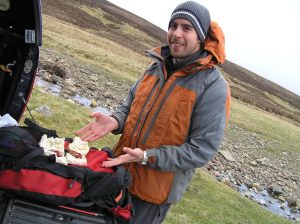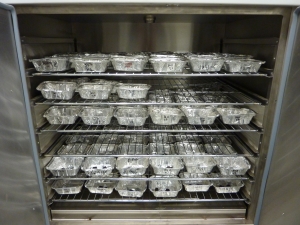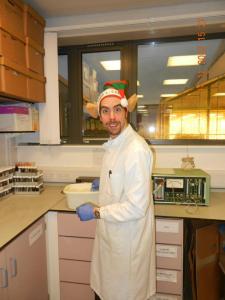Since finishing my PhD, I’ve felt the need to share my experiences: the great wealth of hints and tips that I was lucky to glean from friends and mentors, as well as that most helpful and elusive of things – hindsight. PhDs are intensely and uniquely personal experiences, and this series of experiences, hints and tips could only ever be a personal account. Nevertheless, I hope it makes amusing reading at the very least, and perhaps it might even be of use to you!
- Beginnings
- On fieldwork
- In the laboratory
1. Beginnings
Starting a PhD certainly shouldn’t be a decision that is taken lightly – you’re about to embark on a three/four/five year odyssey of scientific endeavour, a quest for knowledge that will take you to the very edge, and back again, probably several times. Battles will be fought and lost, but victory will also be yours. Some things will have to be sacrificed. You might cry. But you will also laugh, and probably get drunk. On Fridays, you will do both. Without becoming further tangled in the brambly bush of tangents, suffice to say, you’d better like the topic you decide to study, or at the very least find it interesting. Otherwise boredom might quickly turn to resentment and loathing.
Having said that, the decision to begin a PhD is rarely as simple as deciding whether or not you’re into the research topic. I ended up stumbling into mine, as it was suggested at the back end of a job interview. Neither me, nor my potential supervisors, could have any idea of the true nature of the perilous voyage ahead, but I was quite into plants and soil, and liked the sound of carbon cycling, and three years of funded research (i.e. a job) beckoned, so I was in.
Beginning a PhD can be a bewildering experience – there are many new people to meet, IT and lab technicians to get friendly with, maybe other supervisors to meet, and stipends to chase. Before getting too involved, it’s really worth getting to know the library (at each of your institutions, if there are more than one): how many books you can get out, how to access their journal collections, how to get access from home using VPN or a password, how to get inter-library loans organised, or request new material. Knowing your stuff about the library will save you time when it comes to writing your literature review, and make your job much easier. They might also offer courses on how to search databases effectively, or use reference manager software (more on that later).
2. On Fieldwork
Picture the scene. After walking a mile across bumpy ground, through knee-high shrubs, following a two-and-a-half hour drive, I stop, put down my box (heavy with expensive kit) and – relieved – take off my rucksack. The relief, however, is short-lived. Rummaging through my box of sampling equipment, I can’t find four unassuming black modules, which are vital components of the sampling that is the sole purpose of my trip. Without them, I can’t do anything. The unthinkable flashes through my mind as I throw items of clothing from my rucksack. I pick up my phone. At first, the report from my friend is positive: he can’t find anything small and black on my desk – oh, wait, might these small black modules be the ones I mean?
I hang up. All I will have achieved is five hours of driving, and half an hour of yomping over rough ground: a waste of half a tank of diesel and most of a day. This was by far the worst experience of forgetting I had while on fieldwork, but by no means the only one. After that, I made a comprehensive list of things I’d need for each sampling trip, and ticked it off rigorously each time I loaded up the pickup to go sampling again.
Or volunteers, as I believe they like to be called. Unless you’re really efficient and have sampling that is achievable in a human lifetime with two hands, you’ll need some help at some point. I’ve been lucky to work in some great groups, where the help has been readily available on the condition that the favour is returned in kind in the future. This system works really well. Apart from the promise of favours returned, cake, sweets and beer are also excellent incentives. Remember to keep your slaves volunteers well-fed, watered and entertained, and they’ll probably come again.
There comes a time in any project where you have to take a step back to consider the bigger picture, particularly concerning how much time you have left and the questions you still want to address. Fieldwork is demanding, expensive, and exhausting if you’re doing it right, so it’s worth regularly considering whether you’re collecting the most appropriate data. Collaborating with others is a great way of sharing the load and is beneficial for both parties. Don’t just continue fieldwork for the sake of it – if it’s not addressing one of your questions, you’d be better off going back to the drawing board and doing something that does.
3. In the laboratory
Hours. And hours and hours and hours…
The only thing that takes nearly as much time as fieldwork is labwork. It can take absolutely ages, so you should be prepared for much tedium. Investment in some form of portable music device, or even a pair of speakers for the PC in the lab, will stop you from going mad, or at least delay the process. Another good way of saving time is to keep a really thorough notebook – if I had done this right from the beginning, I would have spent much less time hunting for samples I’d diligently hidden deep in freezers. Write everything down, because you never know what might happen.
It’s worth becoming familiar with the instruments (in a purely professional manner, obviously) before it’s your turn to use them, if you can, perhaps by offering to run samples for other people when they are away, in exchange for some tuition. This is where all those hours invested befriending the lab technician will come in useful. If it’s not clear exactly how an instrument is supposed to be used or maintained, or how many standards should be included in a run, it’s worth finding out before starting to analyse those precious samples. If there isn’t a protocol, write one – it’ll be appreciated eventually, and you’ll bask in the glory of being the go-to expert for that machine.
All those hours spend sieving, drying, weighing, pipetting and extracting can take their toll on the soul, so it’s a good idea to structure your lab work so that you can take breaks to regain your sanity and remind yourself what people look like. This generally involves not leaving your lab work until the last minute, so that you don’t have any choice but to plough on through into the early hours. Setting yourself regular breaks during the day for coffee / email pit-stops will act as an incentive, and the less tired you are, the more effective you’ll be, and the fewer mistakes you’re likely to make.




I would like to assume all credit for above mentioned coffee breaks!
Perhaps not all of them, Emma – my rate of consumption definitely increased after you left, in line with my workload – but you certainly were influential in establishing my habit!